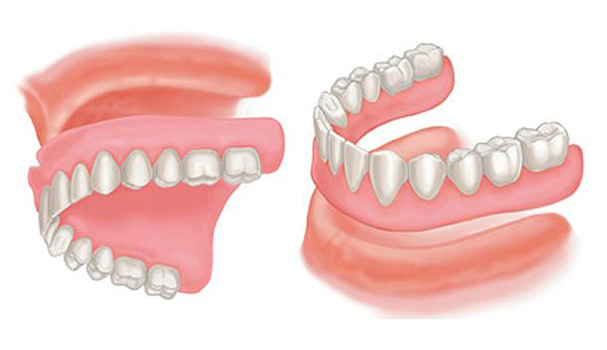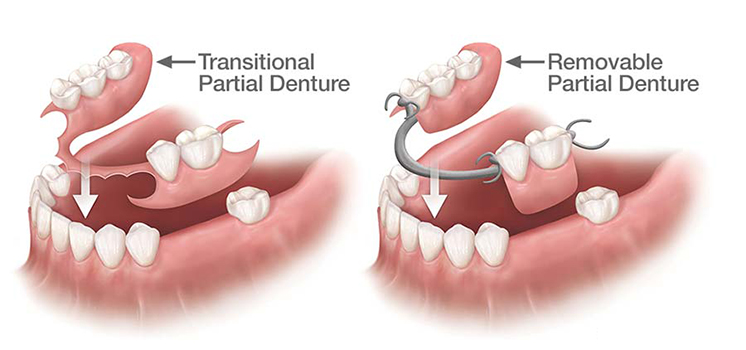Dentures are a time-tested, simple solution that makes sense in certain situations. If you’ve suffered severe tooth decay, injury, or gum disease and need your remaining teeth replaced, an immediate denture can help relieve you of some concerns you may have after the extraction process is complete.
The first step in the process of restoring your dentition with dentures often is to make an immediate denture. An immediate denture, as its name implies, is a denture inserted immediately after teeth removal. It makes the transition to dentures less noticeable and also helps keep you performing everyday functions, like chewing and speaking.

Immediate Denture Treatment
An immediate denture is a prosthetic to replace your teeth right after their removal. First, the dentist will take an accurate impression of the upper and lower arches of your mouth and establish a bite that best resembles your original teeth. The dentist will also help you select the shape and color of the denture teeth and gums.
During the next visit, the dentist will adjust your bite, test your speech and check the appearance and functionality of the denture teeth and gums. Sometimes it is necessary to repeat this step to ensure that everything is just right.
After achieving a satisfactory fit and appearance, the denture is returned to the laboratory for fabrication. Removal of the teeth occurs at the subsequent visit, and the denture will be delivered.
Immediate Denture Limitations
We make every effort possible to create a good and functional immediate denture. However, please keep in mind that immediate dentures by nature are not perfect. After delivery of the immediate denture, it may require several adjustment visits and some time for you and your immediate denture to adapt to each other. When your gums heal following the extractions, they will remodel for about six months, and the denture needs to be re-based or re-lined to fit correctly.
The most crucial point to remember is that adjusting to your immediate dentures is a process; in some cases, it takes weeks or months to get used to your immediate denture.
An immediate denture can also alter your eating; you will not have the same chewing efficiency as you had with your natural teeth. An immediate denture will also change your speaking, and it may require a bit of practicing before you get comfortable. Keep in mind that due to differences in the shapes of the jaws and the strong muscle movements of the tongue and cheek, a lower denture may be harder to keep in the mouth compared to an upper denture.
Fabrication of a ‘final complete denture’ is possible after your jaw has completely healed. The final denture will have a more accurate and comfortable fit than the immediate denture.
Fortunately, there are new alternatives now, such as implants that can help retain your denture better to your jaw and restore functionality that is more like natural teeth.
To learn more about implant retained dentures, please visit our blog article at:
Denture Stabilization with Implants
Partial Denture
Partial dentures are also removable appliances. They are replacement teeth for people who have lost one or more of their teeth. Partial dentures consist of a denture base, a metal framework, and denture teeth. The partial denture then attaches to the existing teeth via clasps.
Partial Denture Treatment
The first step in creating a partial denture is the preparation of the teeth. During this phase, your dentist may prepare the teeth that the partial denture will use for support. Next, your dentist will take an accurate impression of the upper and lower arches of your mouth and record your bite.
At the subsequent visits, your dentist will evaluate your bite, test your speech, and check the appearance and function of the partial denture teeth and gums.
After achieving a satisfactory fit and appearance, the denture is returned to the laboratory for final fabrication.
Partial Denture Adjustments
We will do everything possible to make a good and functional partial denture. It may require several adjustment visits and time for you and your partial denture to adapt to each other. The most crucial point to remember is that adjusting to your partial denture is a process; in some cases, it takes weeks to get used to a partial denture.
A new partial denture can also alter your eating and speaking habits, and it may require a bit of practicing before you get comfortable.
Different Types Of Partial Dentures
There are newly developed techniques for making partial dentures. One such advance is an implant-supporting partial denture that helps give additional support to the partial denture. While it offers extra support, it also requires the placement of implants in your mouth before making the denture.
There is also a partial denture that uses a unique material called Valplast, which is more aesthetically pleasing to the eye. This partial denture does not use metal as its base and has a flexible plastic material instead.
St. Lawrence Dentistry will give you a range of options to choose from to restore your dentition. Our goal is for you to have all the information needed to make an informed decision.
Dentures and dental implants are the two standard restoration options for missing teeth. However, there are differences to consider between the two choices, including comfort level, confidence level, cost, and durability:
- Comfort Level – Most denture wearers experience discomfort at some point or another because, over time, gum tissues tend to shrink, leaving the denture with a loose fit. This instability can cause gum irritation and mouth sores. Adjustments occur over the life of the denture due to gum and jaw bone shrinkage. To achieve the best fit, denture wearers must use messy dental adhesives. Upper dentures also tend to affect the taste of foods because the palate is covered. On the other hand, dental implants are permanent, natural-looking, and very functional. Implants also offer the same force for biting as natural teeth and do not interfere with the taste of food.
- Confidence Level – Dentures tend to slip, restricting the wearer’s ability to talk and eat. A person with dental implants, he or she never has to fear these kinds of embarrassing moments. Properly placed implants are stable and function just like natural tooth roots.
- Cost – Dentures fabrication is quick; they are durable and cost much less than implants. However, the wearer’s gums tend to shrink over time, and additional trips to the dentist are necessary for periodic adjustments and denture replacements. Dental implants can be a significant investment as they cost more initially, but implants require no further changes, substitutions, or additional trips to the dental office.
- Durability – Although dentures are strong enough to last a lifetime, dentures do nothing to prevent the shrinkage of bone and gum mass, often resulting in the need for re-fittings or replacements. Gum and bone shrinkage also cause a change in the bite, and wear and tear of the denture chewing surface. Dental implants help preserve the patient’s gum and bone mass. Implants are permanent, dependable, and a life-long solution to missing teeth.




